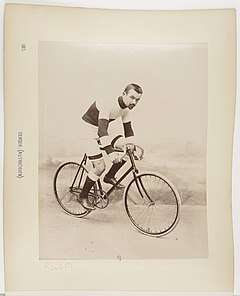Franz Gerger
Franz Gerger (* 4 September 1868 in Oberradling, Austria-Hungary; † 27 March 1937 in Graz) was an Austrian racing cyclist.[1]
 Franz Gerger | |||||||||||||||||
| Personal information | |||||||||||||||||
|---|---|---|---|---|---|---|---|---|---|---|---|---|---|---|---|---|---|
| Born | 4 September 1868 Oberradling, Vas, Austria-Hungary | ||||||||||||||||
| Died | 27 March 1937 (aged 68) | ||||||||||||||||
| Sport | |||||||||||||||||
| Sport | Cycling | ||||||||||||||||
Medal record
| |||||||||||||||||
In 1883 Hungary-born Franz Gerger moved to Graz, where, at the age of 22 he learned to ride a bike under Austria's first bike trainer Alexander Gayer. Gerger started his racing career as a road racer. In the long distance race Wien–Berlin in 1893 he came in third after German star riders Josef Fischer and Georg Sorge on a bike provided by Johann Puch. Being the only one of the top-placed riders who didn't change his bike, a Styria-touring bike, he won a special prize.[2][3][4] In the same year he won the 100 kilometer road championship of the Austrian Federation of German riders. In 1894 he took third place in the Mailand-München long distance race, but his big international breakthrough came in 1895. He signed up for the amateur version of the famous French Bordeaux–Paris race and set a new record time beating all the famous professionals of the time.[5][6] Later that year he came in second in Straßburg-Basel-Straßburg behind Marius Thé, but ahead of German star Thaddäus Robl and Maurice Garin, who would go on to win several Paris-Roubaix' and the inaugural Tour de France in 1903.[7]
Afterwards Gerger turned Pro and he started specializing in the more lucrative track disciplines. At the 1896 World Championships he won the bronze medal in the motor-pacing event, finishing behind Arthur Adalbert Chase and John William Stocks, and in 1897 he won the European title in the same discipline. During his career Franz Gerger set a total of eight world records.[6] In 1902 he wrapped up his career with a win in the Austrian classic Wien-Semmering-Wien.
After his career he became the representative of a bike manufacturer in Budapest.[8]
Palmarès
- 1893
- 3. Wien - Berlin
- 1. Road Championship of the German Cycling Federation for Austria
- 1. Graz - Lebring
- 1. Sankt Andrä - Sankt Pölten - Sankt Andrä
- 5. Maastricht - Nijmegen - Maastricht[9]
- 1894
- 3. Mailand - München
- 1895
- 1. Bordeaux - Paris (amateurs, new course record)
- 2. Straßburg - Basel - Straßburg
- 1896
- 3. World Championship - Motor-pacing
- 1897
- 1. European Championship - Motor-pacing
- 1902
- 1. Wien - Semmering - Wien
References
| Wikimedia Commons has media related to Franz Gerger. |
- "Franz Gerger". CyclingRanking.com.
- "Wien-Berlin". Allgemeine Sport-Zeitung.
- "Wien-Berlin 1893". CyclingRanking.com.
- Walter Ulreich; Wolfgang Wehap (2016), Die Geschichte der PUCH-Fahrräder (in German), Gnas: Weishaupt, p. 85
- "Bordeaux-Paris 1895". CyclingRanking.com.
- Sport-Album der Rad-Welt, 7 Jg., 1909, S. 18
- "Straßburg-Basel-Straßburg 1895". CyclingRanking.com.
- "Coureurs et velodromes". Le Véloce Sport.
- "Maastricht-Nijmegen-Maastricht 1893". CyclingRanking.com.